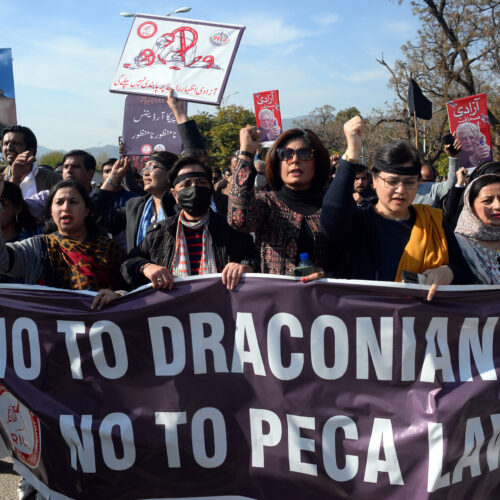Deep Flaws in Pakistan’s Cyber Defamation Law Threaten Press Freedom
This statement can be attributed to the Clooney Foundation for Justice. For further inquiries, please contact [email protected]

Pakistan’s Prevention of Electronic Crimes Act (PECA) has been misused to target the press and suppress free speech, according to a report that the Clooney Foundation for Justice’s TrialWatch initiative published today.
While PECA was initially justified as a measure to address hate speech and misinformation online, the law also grants the authorities significant power to block or criminalize speech. Section 20 of PECA, in particular, criminalizes “intentionally and publicly” displaying, transmitting, or exhibiting electronically “any information … which [the person] knows to be false” and which “intimidates or harms the reputation or privacy of a natural person.” Those charged under the law face up to three years behind bars, despite the UN Human Rights Committee’s conclusion that ‘imprisonment is never an appropriate penalty’ for defamation. TrialWatch’s new report analyzes several cases where PECA has been used against journalists criticising the government or government officials.
The Pakistani Supreme Court is currently reviewing Section 20 of PECA. A lower court has already deemed parts of this section unconstitutional and asked the government to investigate its abuse. The government should concede that the law is unconstitutional and contrary to Pakistan’s international human rights obligations and reform it accordingly, TrialWatch said today.
TrialWatch monitors criminal trials globally against those who are most vulnerable, including journalists, and advocates for the reform of unfair laws. TrialWatch’s analysis reveals that PECA is being invoked to protect government interests rather than those of individuals. Its use against journalists speaking about state institutions or officials flies in the face of the UN Human Rights Committee’s conclusion that governmental authorities “should not prohibit criticism of institutions, such as the army or the administration” and that “all public figures, including those exercising the highest political authority such as heads of state and government, are legitimately subject to criticism and political opposition.”
The report highlights several PECA cases prosecuted by the authorities that implicate the right to freedom of speech: Journalists Bilal Ghauri, Absar Alam, and Asad Ali Toor received summonses from Pakistan’s Federal Investigative Agency (“FIA”) regarding complaints lodged against them under the PECA. Ghauri was summoned, via WhatsApp, without any information on the basis for the complaint, with the summons coming after he uploaded videos on YouTube that challenged the official narrative of Pakistan’s history and army. He explained to TrialWatch, PECA “has made it easier for the authorities in Pakistan to target journalists, and you cannot say anything about it because the law has provided those persecutions with a legal cover.”
Toor and Alam both received FIA summonses after commenting publicly on the financial dealings of the same government official. In Toor’s case, the First Information Report—the police document that launched the case—alleged Toor “used derogatory language and negative propaganda for high-level government institutions, including the Pakistan Army, through his social media posts which is a grave crime.” Toor’s lawyer subsequently told the court that the private individual who made the complaint (not the government official himself) was most likely acting as a proxy for the government. In Alam’s case, the complaint stated that he had been “uploading defamatory tweets against the state individuals and state departments”—again suggesting the law was being used to protect state interests. “I was just using my right to free speech, right to ask questions, and right to an opinion,” Alam said to TrialWatch. “Based on this, they charged me with section 20 under the cybercrime act.”
Under the Imran Khan government, law enforcement regularly misused PECA to protect state institutions from criticism and to harass journalists, according to a recent report in the Pakistani English-language news outlet, Dawn. The report concluded that PECA has been proven to be “an effective weapon in the hands of the state, to harass, intimidate and silence critics.” A 2021 Freedom Network Report found that over the prior two years, at least 23 Pakistani journalists had been targeted under the Act. In fact, the prior Pakistani government adopted an Ordinanceseeking to amend PECA to explicitly enable its use against those who criticize government institutions, rather than just ‘natural persons.’ The Islamabad High Court subsequently struck down this Ordinance as unconstitutional.
And yet instead of reforming laws like PECA, the authorities are still using PECA, and additional measures to curtail speech are being considered. There has been a debate on a potential new bill that would criminalize ‘defamation of the army.’ The Shehbaz Sharif government also reportedly empowered the FIA to pursue “rumors and false information against state institutions” on social media And a Committee was constituted to consider amendments to PECA to crack down on ‘fake news.’
Pakistan is not the only country where criminal defamation and insult provisions protect state institutions and officials from criticism. In Thailand, TrialWatch has been monitoring prosecutions for ‘insulting royalty’. In Tunisia, a case was launched against a blogger for comments about alleged police brutality because a police official felt personally insulted. And in Uganda, a women’s rights activist was charged with ‘offensive communication’ for a poemabout the country’s President.
“If they continue to be able to arrest any journalist and put him behind bars, who will bother to do journalism in Pakistan in the future?” Ghauri said.
To read the TrialWatch report and the case studies analyzed in it, you can click here .
To learn more about TrialWatch’s work in Pakistan, you can click here.